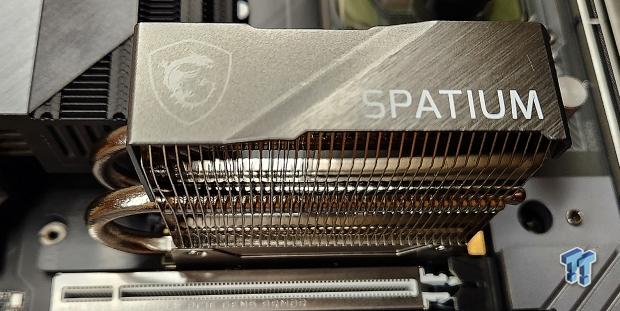
The Bottom Line
Pros
- + Effective passive cooler
- + Gaming
- + User experience
Cons
- - Not PS5 compatible
Should you buy it?
AvoidConsiderShortlistBuyIntroduction & Drive Details
MSI is upping its flagship Gen5 performance from 10,000 MB/s to a mind-bending 12,400 MB/s. MSI's newest flagship performer is unsurprisingly another "Spatium" SSD, the full name of which is quite a mouthful being MSI Spatium M570 Pro PCIe 5.0 NVMe M.2 2TB FROZR. MSI's newest is set to compete the likes of Corsair's MP700 Pro and GIGABYTE's AORUS Gen5 12000 for PCIe Gen5 supremacy.
All consumer PCIe Gen5 SSDs made to date are powered by Phison's E26 controller and arrayed with Micron B58R flash running at either 1,600 MT for the 10,000 MB/s drives or 2,000 MT for the 12,400 MB/s drives. With all having similar hardware configurations and firmware revisions, performance between different brand E26-controlled SSDs of the same capacity and throughput class has been virtually the same to this point.
Most of what has been done to differentiate between brands has been manifested in custom cooling designs and TBW ratings. However, as we just saw with Crucial's 4TB T700, we are now getting some performance distinctions between similarly arrayed E26 offerings through firmware revisions.
To this point, all the 12,000 MB/s class offerings we've tested at 1-2TB capacity points have been running on firmware revision EQFM22.1, and they all perform identically. MSI's newest represents the first 12K class SSD we've encountered running on newer EQFM22.2 firmware, and it does indeed run differently than those that have come before it. Overall, the newer firmware makes the SSD significantly more powerful at the expense of about 100 MB/s sequential write throughput. Hey, we'll take that tradeoff any day of the week.
Aside from the firmware differentiation we have with the Spatium M570 Pro, we also get a custom cooling solution by way of a passively cooled heat pipe tower cooler. This cooler is quite effective, as evidenced by the following screenshot:
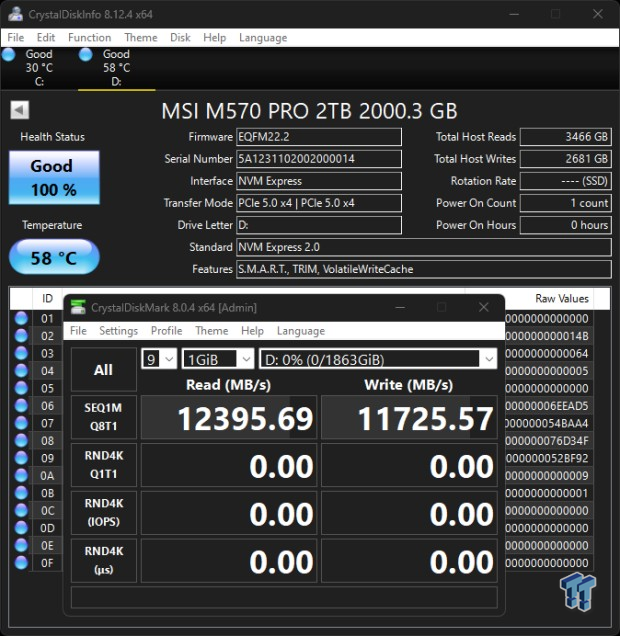
We ran two back-to-back iterations of CDM x9 sequentials, which is enough to push any PCIe Gen5 SSD to the edge, and our M570 Pro stayed cool at 58c max. And no noise. Impressive.
Drive Details
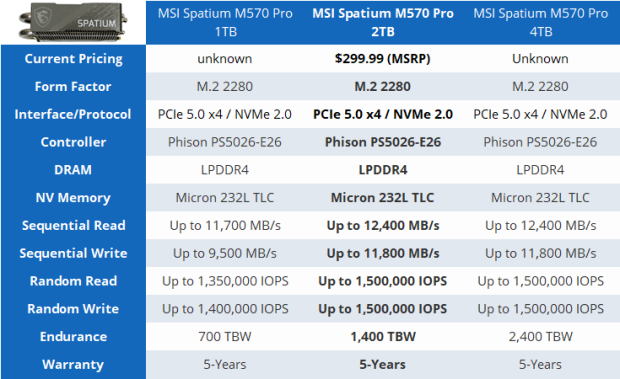
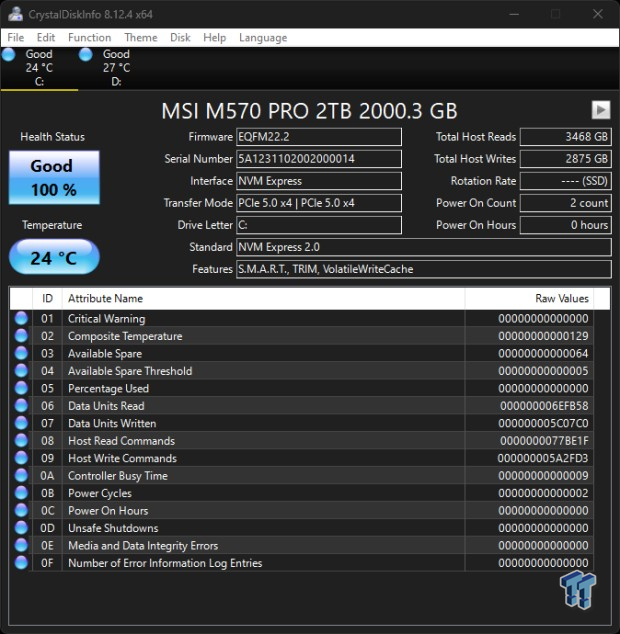
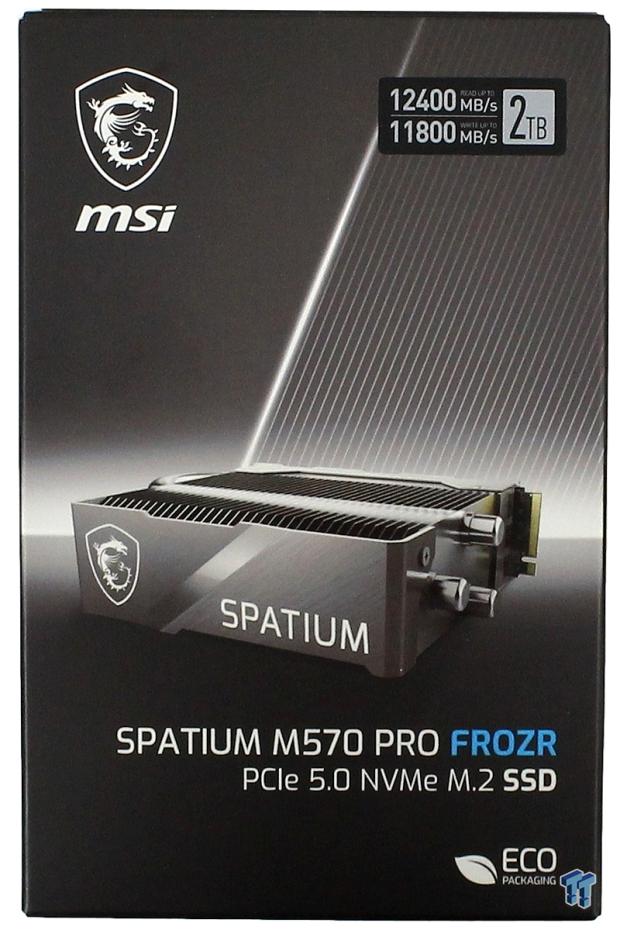
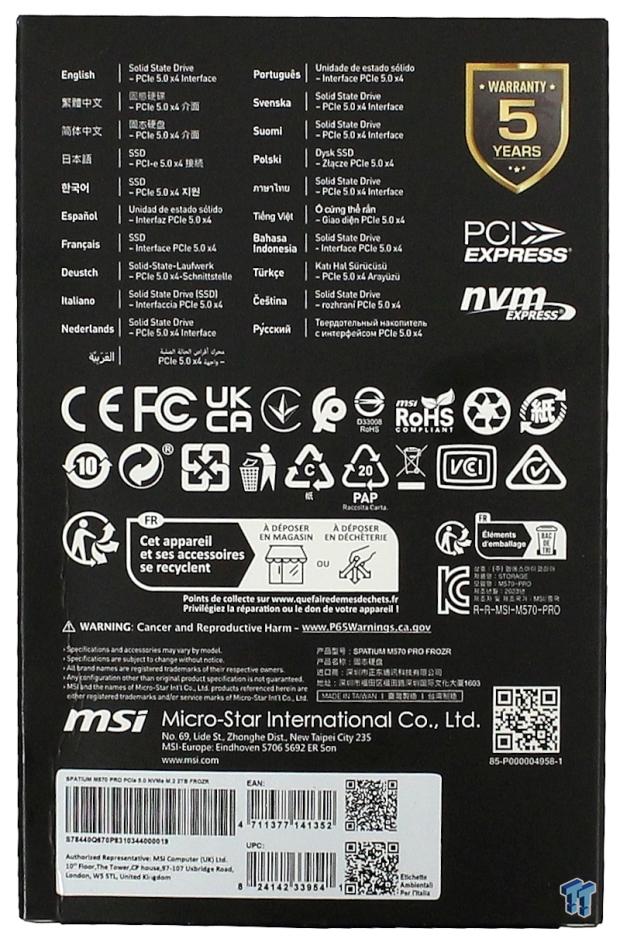
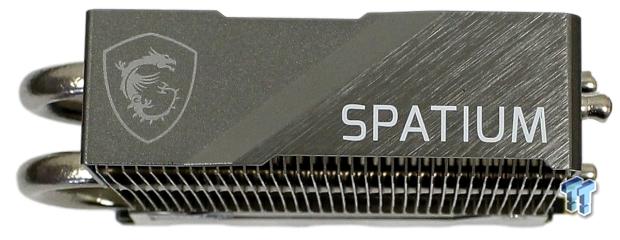
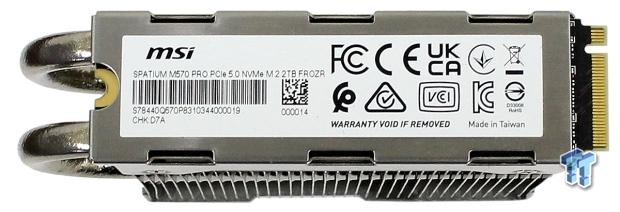
All we have at this point is MSRP pricing for the 2TB model, but we do expect to see street pricing come in a bit lower, especially considering the current market climate and stiff brand competition.
Jon's Test System Specifications
Intel Test System
- Motherboard: GIGABYTE AORUS Z790 Xtreme X
- CPU: Intel Core i9-14900K - Buy from Amazon
- Cooler: Alphacool Eissturm Hurricane Copper 45 - Buy from Amazon
- RAM: Patriot Viper Xtreme 5 8000 48GB - Buy from Amazon
- Graphics Card: MSI SUPRIM X RTX 3080 12GB - Buy from Amazon
- Case: PrimoChill's Praxis Wetbench - Buy from Amazon
- Power Supply: be quiet! Dark Power Pro 12 1200W - Buy from Amazon
- OS: Microsoft Windows 11 Pro 64-bit - Buy from Amazon
AMD Test System
- Motherboard: GIGABYTE X670E AORUS Master
- CPU: AMD Ryzen 9 7950X - Buy from Amazon
- Cooler: Alphacool Eissturm Hurricane Copper 45 - Buy from Amazon
- RAM: Sabrent Rocket DDR5 32GB - Buy from Amazon
- Graphics Card: MSI SUPRIM X RTX 3080 12GB - Buy from Amazon
- Case: PrimoChill's Praxis Wetbench - Buy from Amazon
- Power Supply: be quiet! Dark Power Pro 12 1200W - Buy from Amazon
- OS: Microsoft Windows 11 Pro 64-bit - Buy from Amazon
Because we at TweakTown like to be first at everything whenever we can, we will present our storage performance results for the test subject on both 14th Gen Intel and 7000 Series AMD platforms going forward for the foreseeable future. Because Intel still delivers the best real-world storage performance, (Look Here), our running chart will continue to be Intel-based until AMD can deliver better real-world storage performance than its rival.
Synthetic Benchmarks: CDM, Anvil, ATTO
CrystalDiskMark
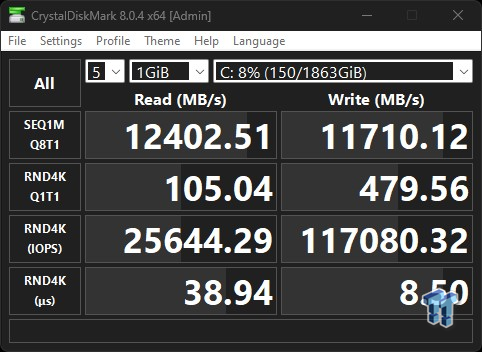
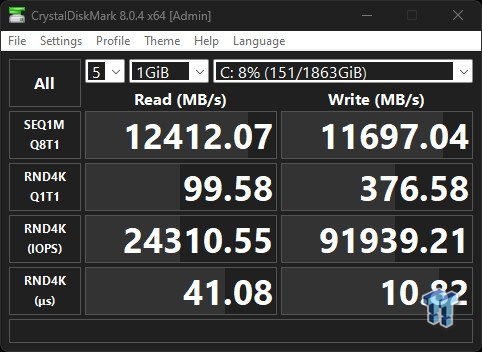
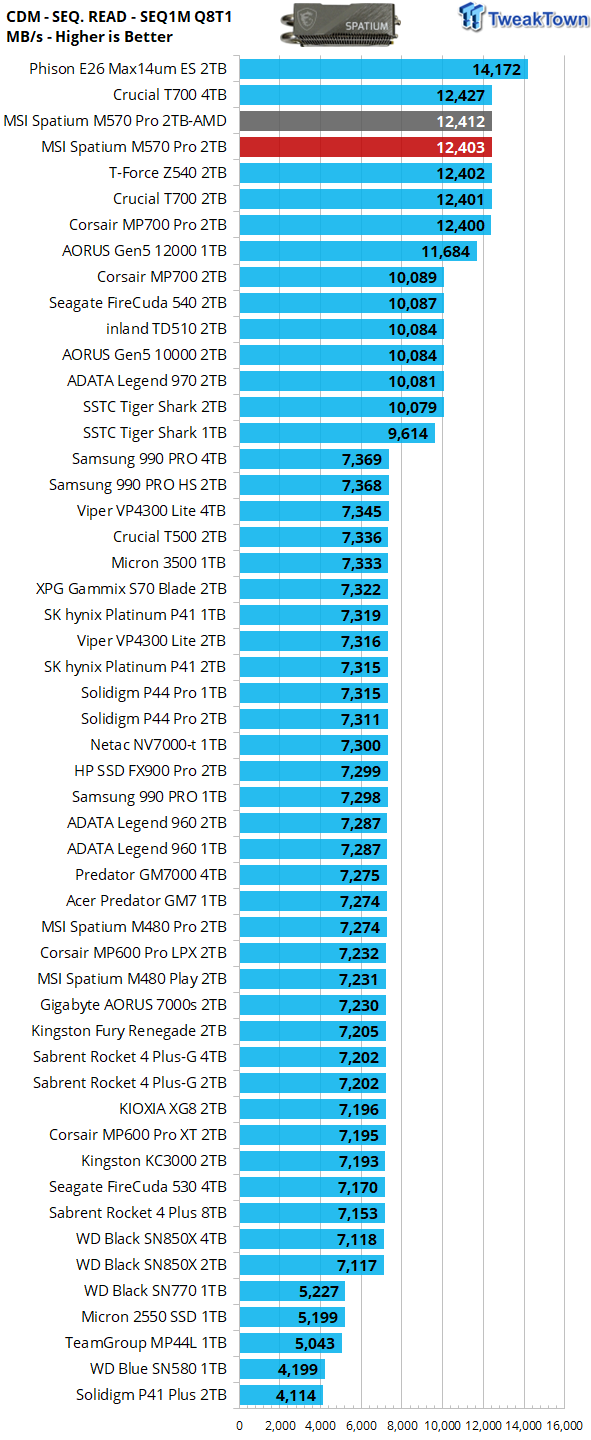
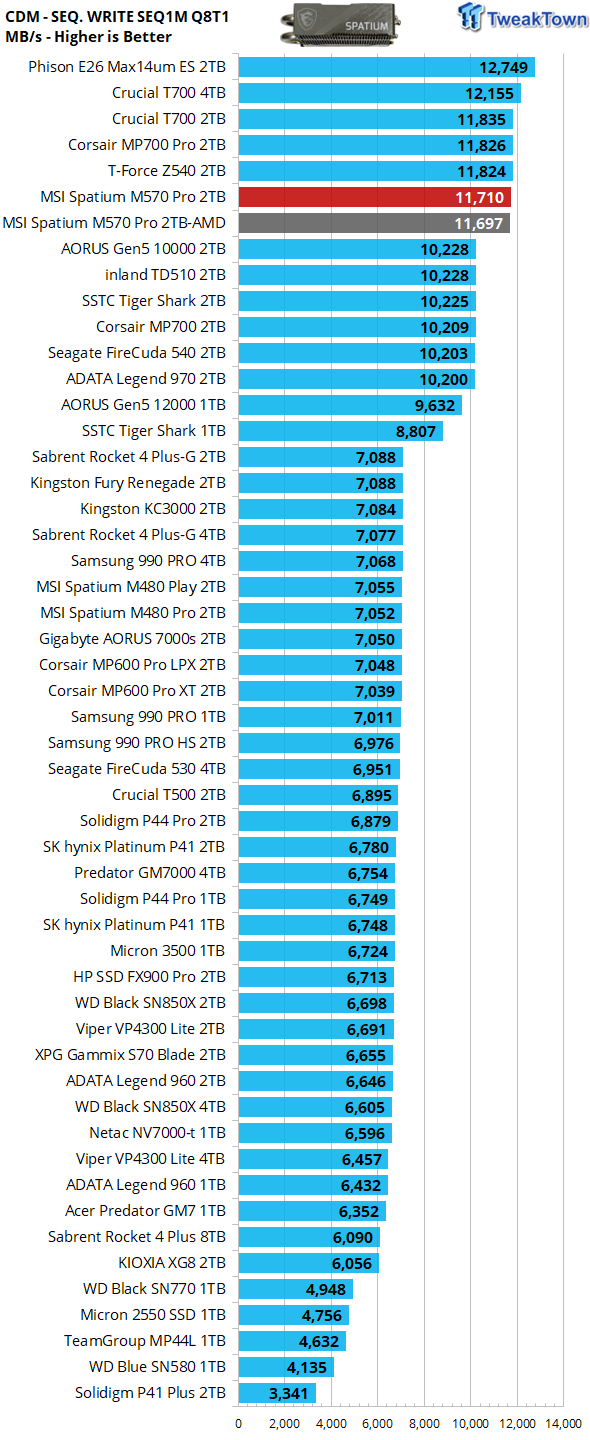
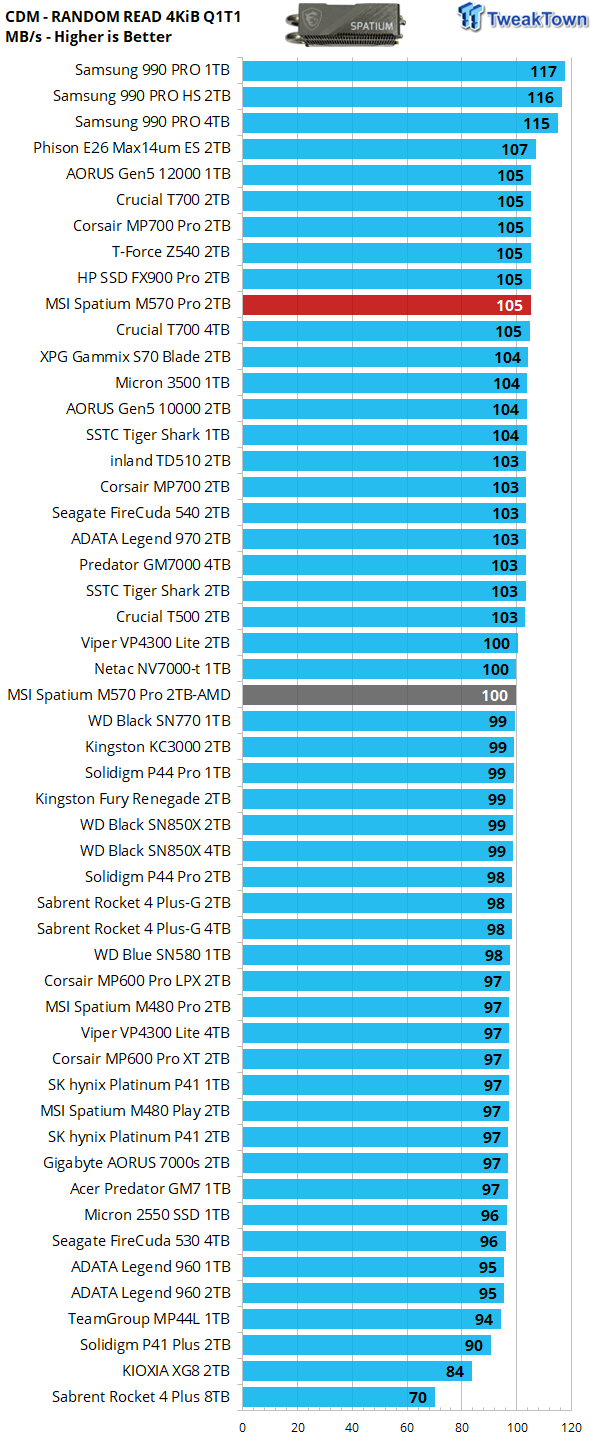
We employ CDM as our standard measurement for both sequential throughput and Q1T1 random read. MSI specs its 2TB Spatium M570 Pro SSD as capable of up to 12,400 MB/s sequential read throughput and up to 11,800 MB/s sequential write throughput. Our test subject delivers as advertised for read throughput but falls a bit short of its factory spec of 11,800 MB/s for sequential write throughput. No biggie, sequential write throughput is not a very important performance metric anyway, and like we stated previously, better real-world performance is the tradeoff here. Q1T1 random read is exactly the 105 MB/s we've come to expect from 12,000 MB/s class drives.
Anvil's Storage Utilities
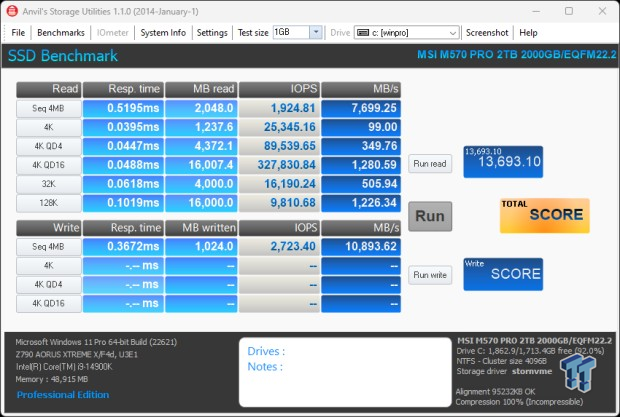
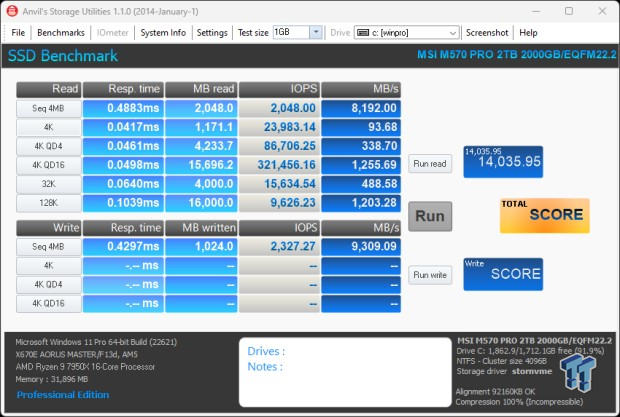
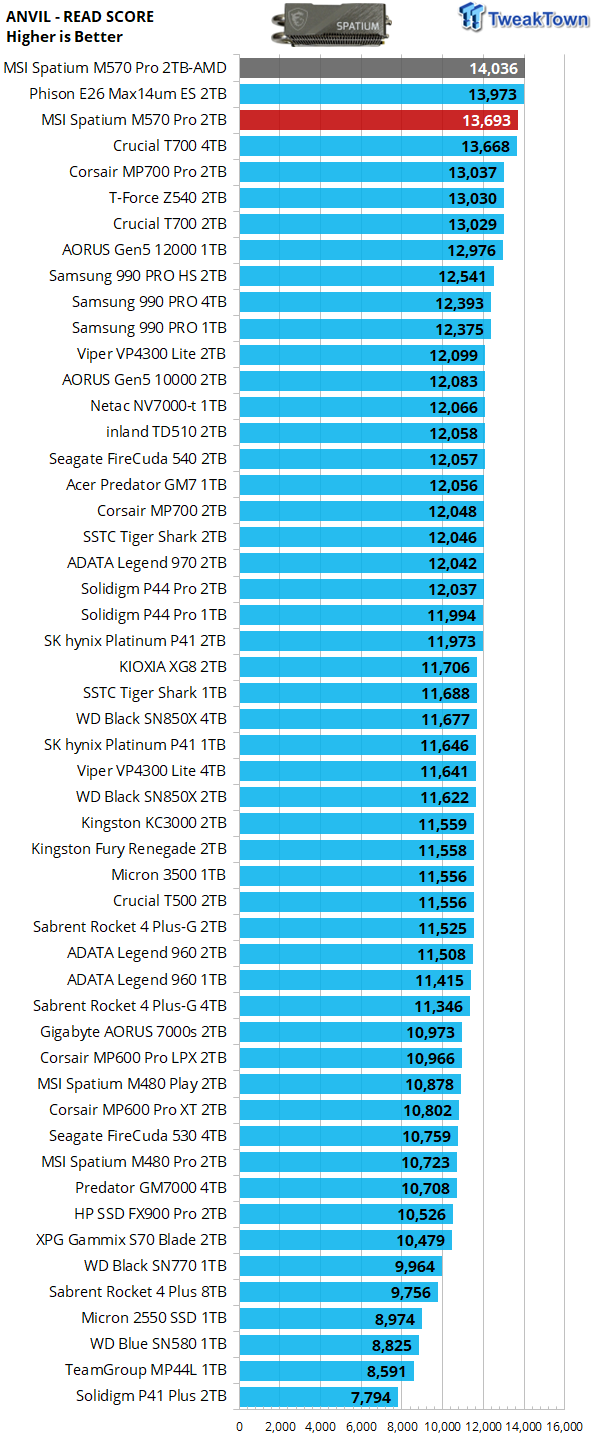
Our test subject rewards us with the highest score we've obtained to date from a retail consumer SSD. It's a massive improvement over drives like the Z540 or MP700 Pro. Better read performance, even if it's synthetic, can and, in this case, does indicate better real-world performance.
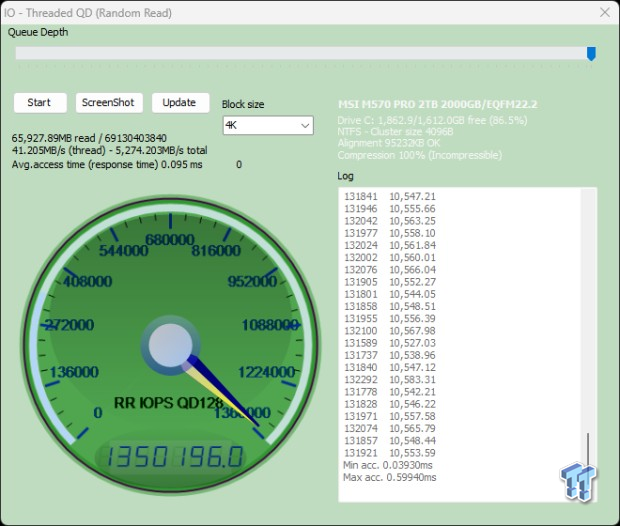
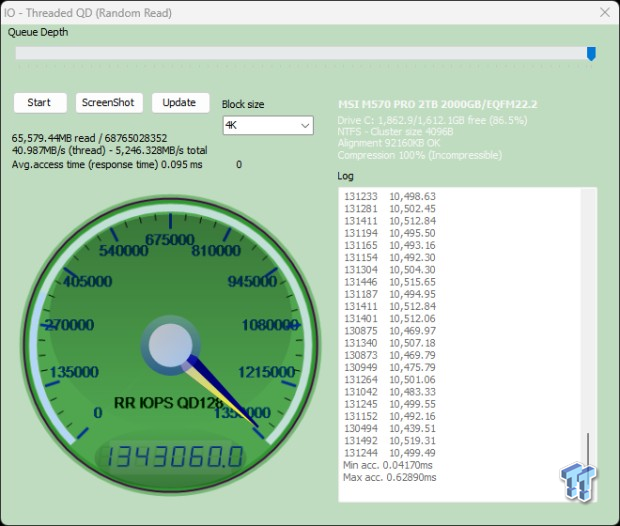
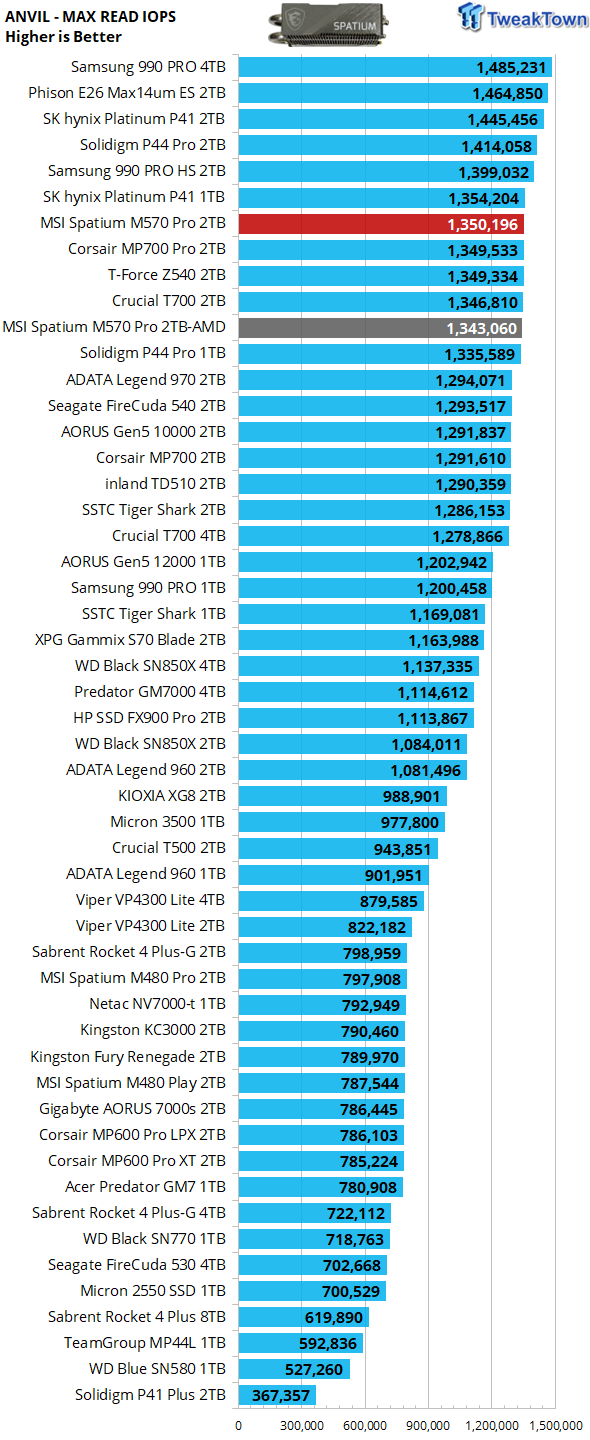
We employ Anvil's random read test as our standard for measuring max random read IOPS. This test is very accurate as it at its core is Iometer skinned over. We test at QD128. We come up a bit short of the drive's quoted up to specs being 1.5 million RR IOPS. However, it is, and again by just a few IOPS, a new high mark for a retail E26-controlled SSD. Impressive.
ATTO
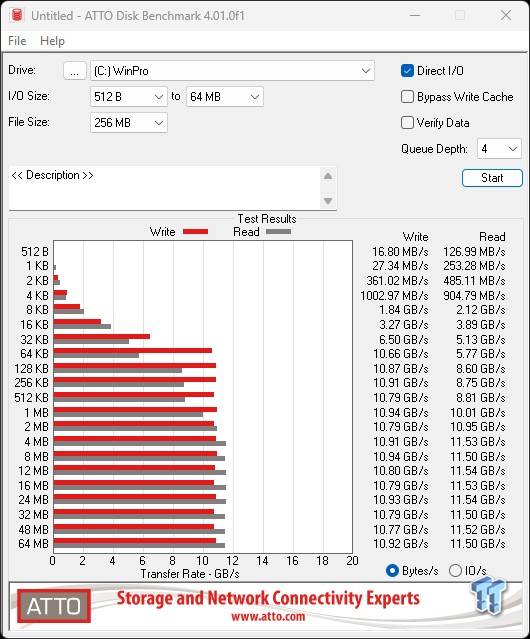
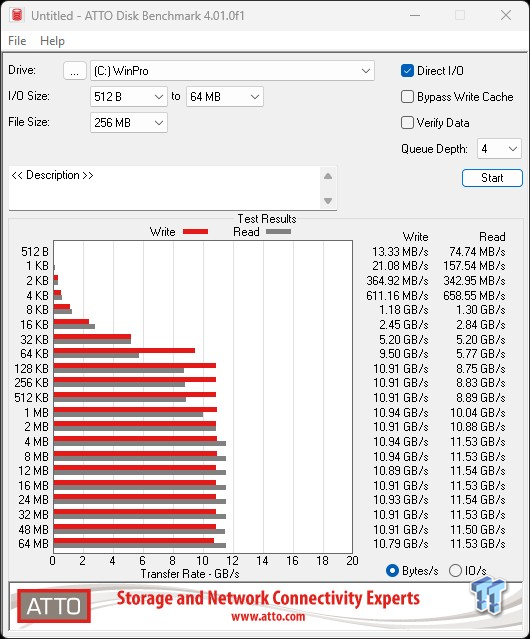
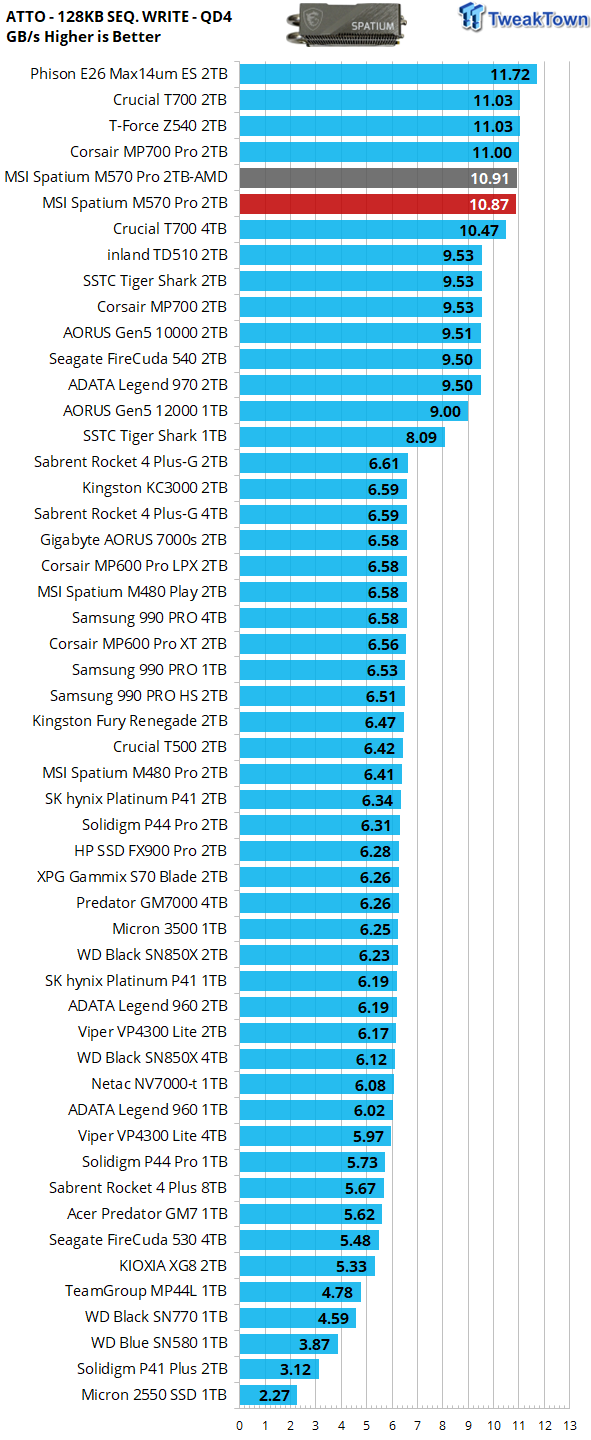
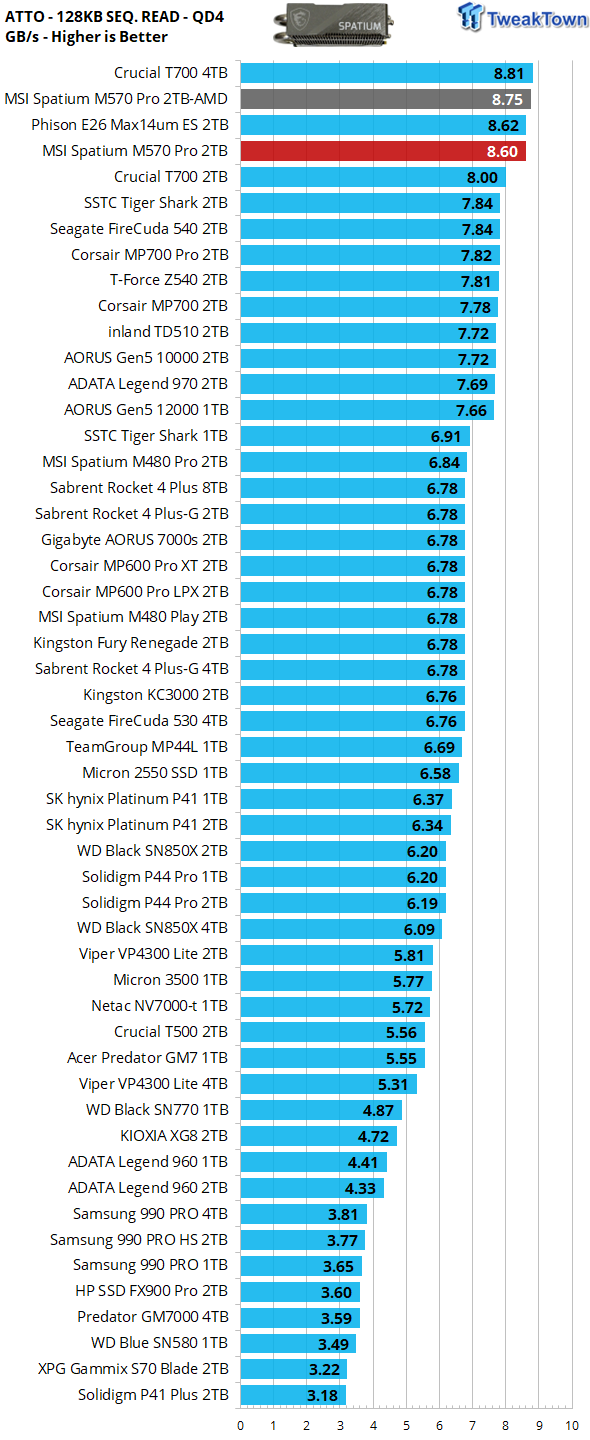
ATTO gives us a clear picture of what transfer sizes a particular SSD favors in terms of QD4 sequential throughput. Our test subject favors sequential transfers of 4MB or larger when serving data to the host (reading) and 128K or larger when programming (writing) data.
Real-World Testing: Transfers, 3DMark SSD Gaming Test, PCM10 Storage
Transfer Rates
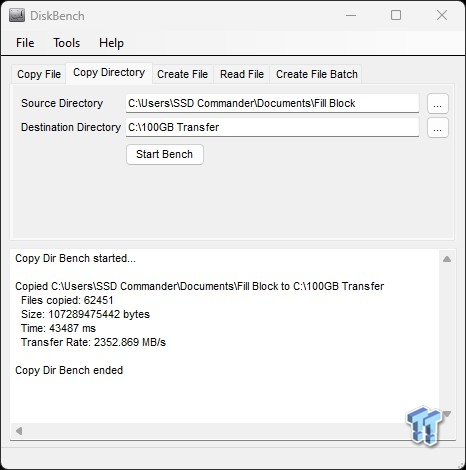
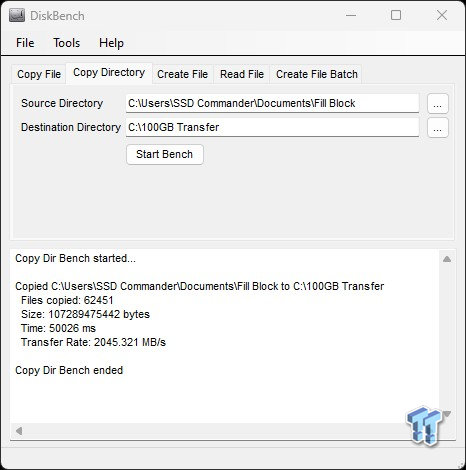
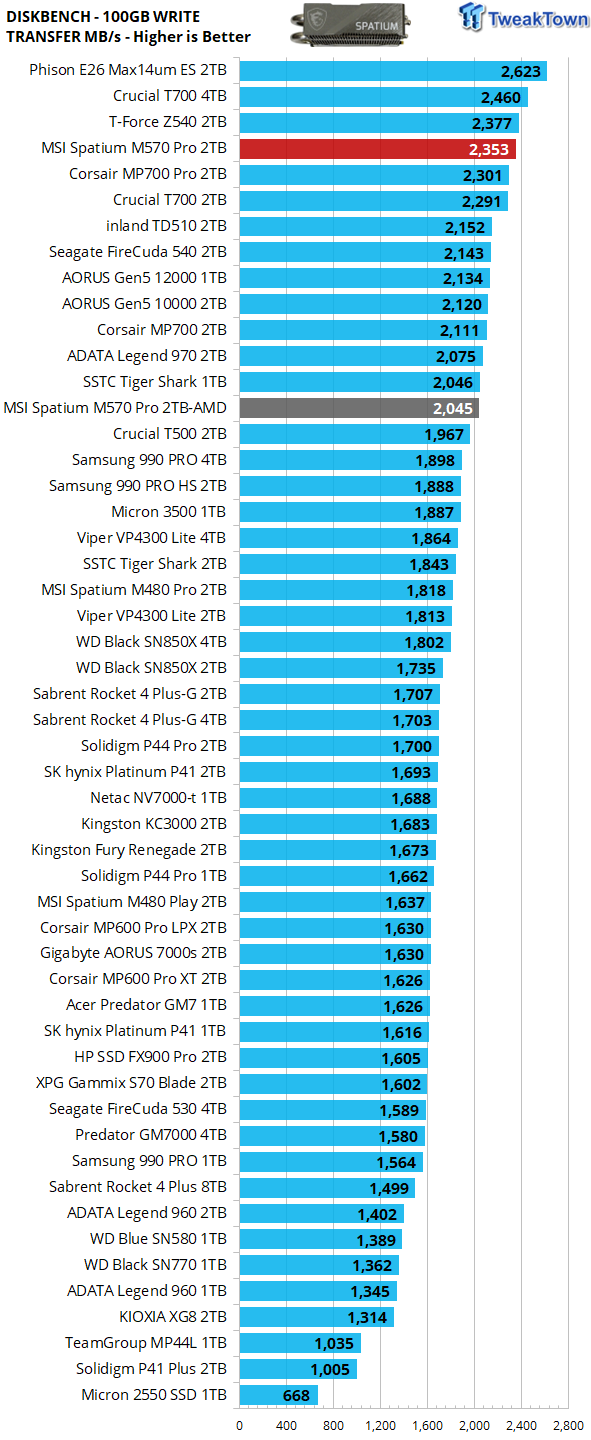
Our 100GB data transfer test is not your ordinary 100GB of data. Ours is a crushing mix composed of more than 62K files. Write performance, random or sequential, is an infrequent operation, and as such, we do not consider it to be an important performance metric in the consumer space. An example being how many times is a game installed vs. how many times it's played. Second best for a retail flash-based SSD.
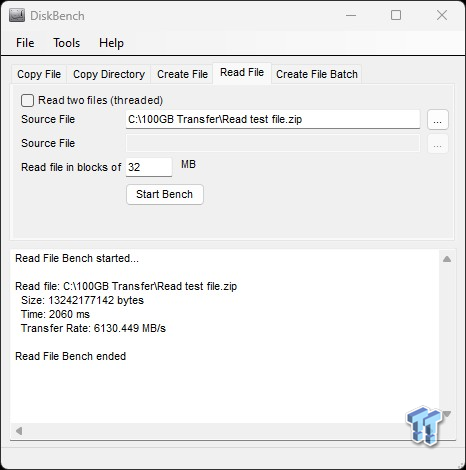
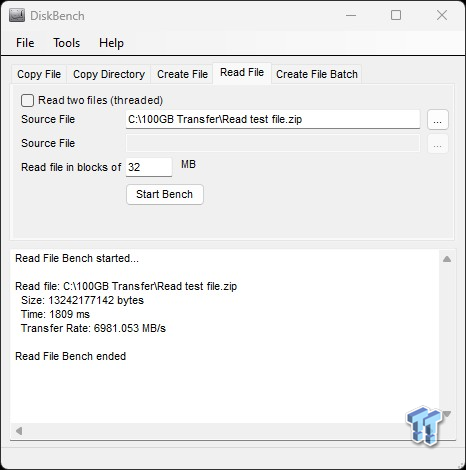
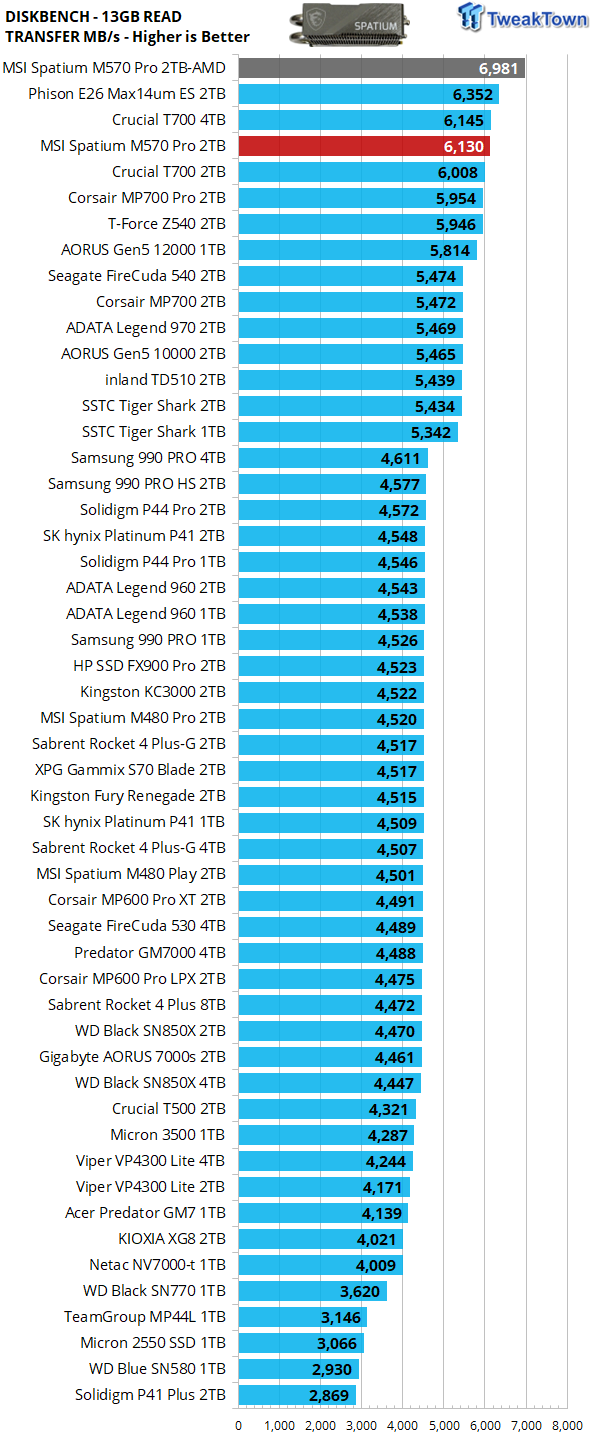
Unlike programming (writing) data, serving data to the host (reading) data is always an important performance metric, and here again, our test subject does it significantly better than any 2TB retail SSD we've tested to date. Outstanding.
3DMark SSD Gaming Test
UL's newest 3DMark SSD Gaming Test is the most comprehensive SSD gaming test ever devised. We consider it superior to testing against games themselves because, as a trace, it is much more consistent than variations that will occur between runs on the actual game itself. This test is the same as running the actual game, just without the inconsistencies inherent to application testing. In short, we believe that this is the world's best way to test an SSD's gaming prowess and accurately compare it against competing SSDs. The 3DMark SSD Gaming Test measures and scores the following:
- Loading Battlefield V from launch to the main menu.
- Loading Call of Duty Black Ops 4 from launch to the main menu.
- Loading Overwatch from launch to the main menu.
- Recording a 1080p gameplay video at 60 FPS with OBS (Open Broadcaster Software) while playing Overwatch.
- Installing The Outer Worlds from the Epic Games Launcher.
- Saving game progress in The Outer Worlds.
- Copying the Steam folder for Counter-Strike Global Offensive from an external SSD to the system drive.
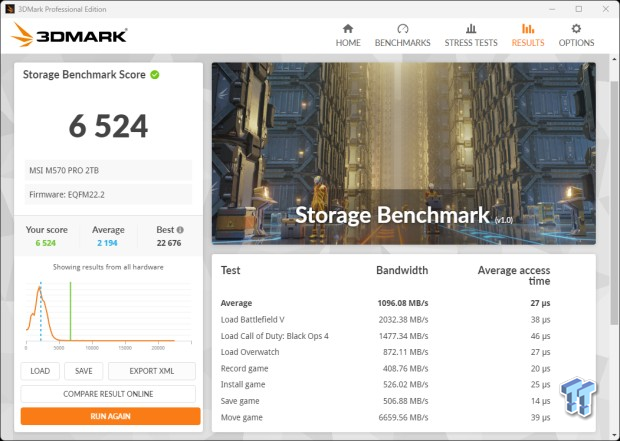
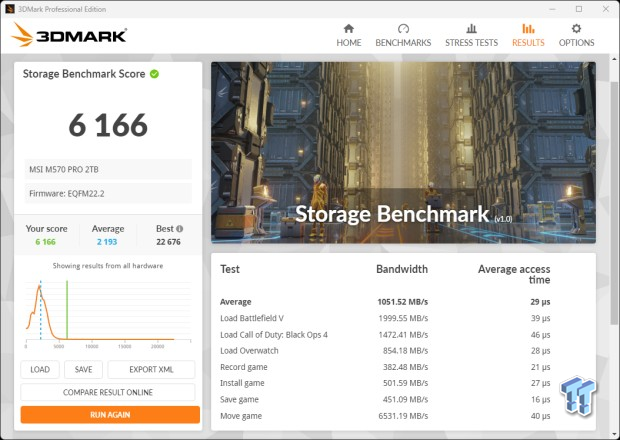
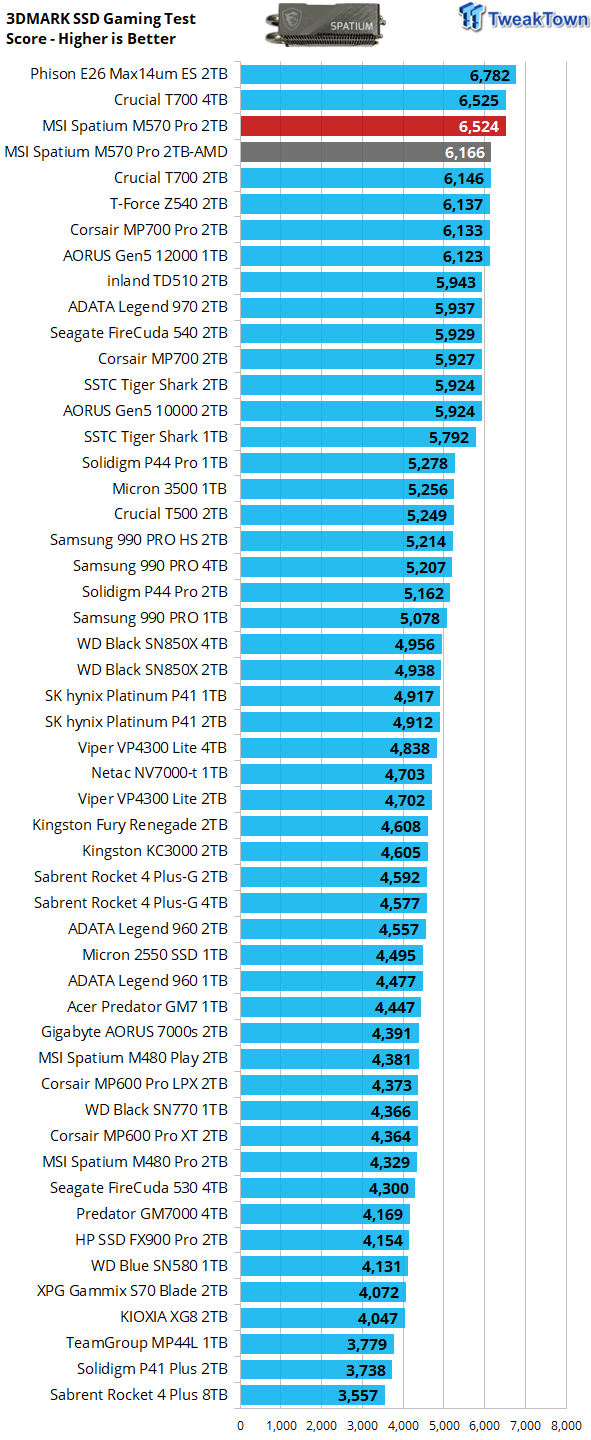
Gaming is a performance metric that matters to most DIY consumers, especially for the enthusiast crowd that TweakTown caters to. A score of 6,500 is a massive firmware-induced improvement over the expected 6,100 delivered by all previous 2TB 12K class competitors. And as it is with all current Phison-controlled SSDs, the Spatium M570 Pro has Phison's exclusive I/O+ DirectStorage enhancing technology baked right in, making it a future-proof choice for gaming duties.
PCM10 Storage Tests
PCMark 10 Storage Test is the most advanced and most accurate real-world consumer storage test ever made. There are four different tests you can choose from; we run two of them.
The Full System Drive Benchmark and the Quick System Drive Benchmark. The Full System Drive Benchmark writes 204 GB of data over the duration of the test. The Quick System Drive Benchmark writes 23 GB of data over the duration of the test. These tests directly correlate with mainstream user experience.
PCMark 10 Full System Drive Benchmark
This test writes 204GB data and covers a broad range of common consumer tasks, including booting Windows 10, file transfers, Adobe and Office applications, startup times for games including Battlefield V, COD Black Ops 4, and Overwatch. Unlike synthetic numbers, this is comprehensive real-world data, which is why we use it to rank SSDs in terms of user experience.
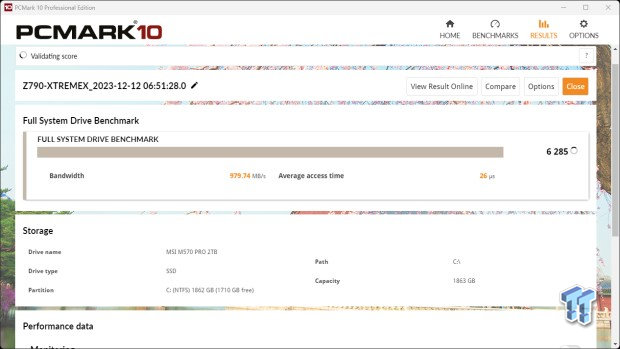
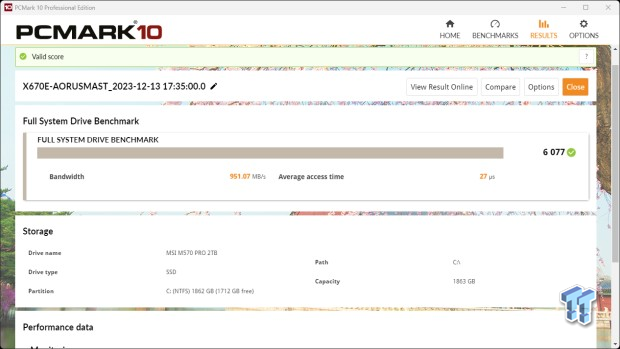
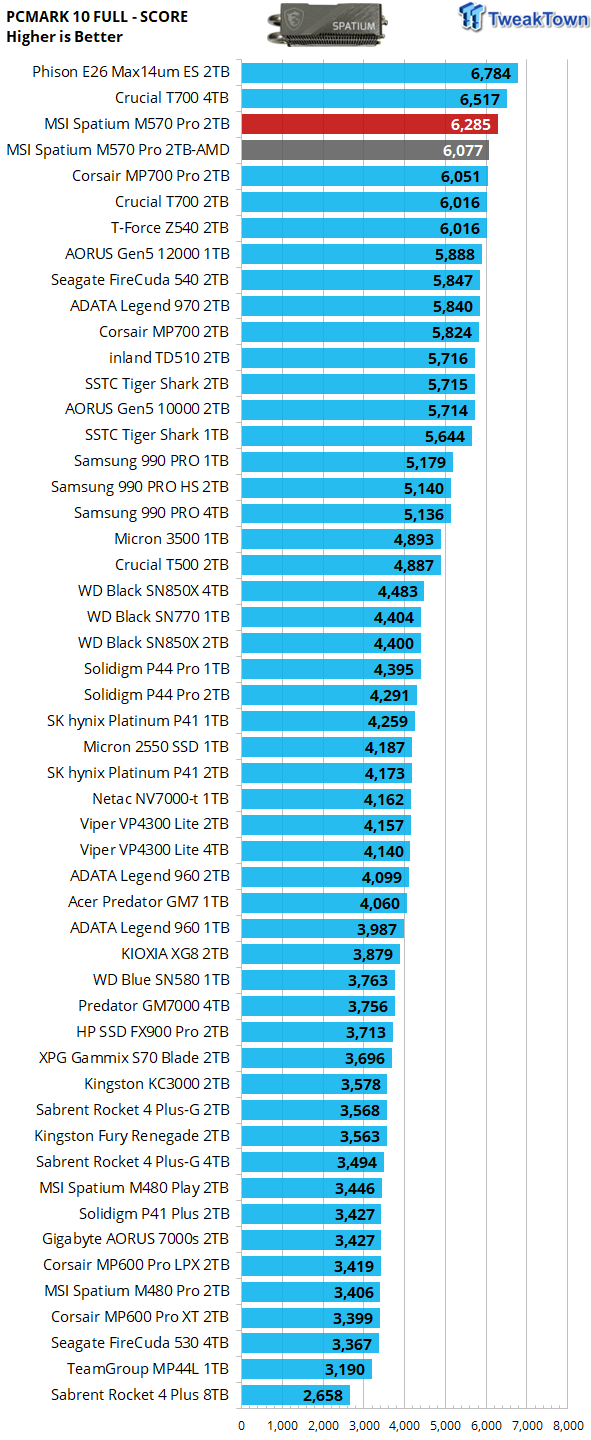
Our test subject is again, by a significant margin, the highest performing 2TB retail SSD we've tested to date. Even more impressive, when running on AMD, our test subject even outperforms the direct competition running on Intel.
PCMark 10 Quick System Drive Benchmark
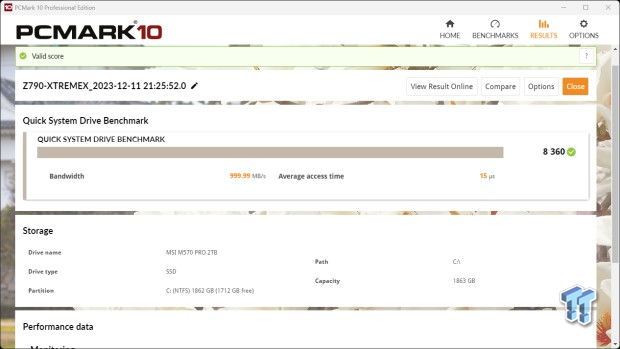
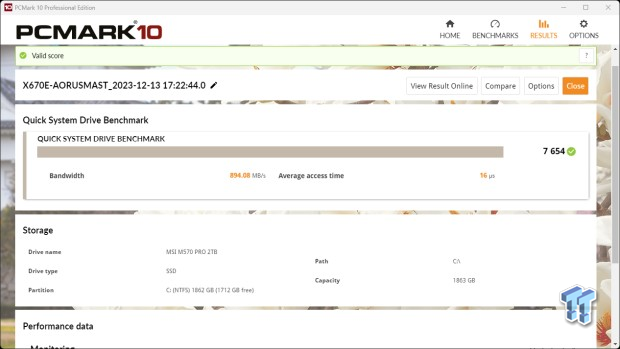
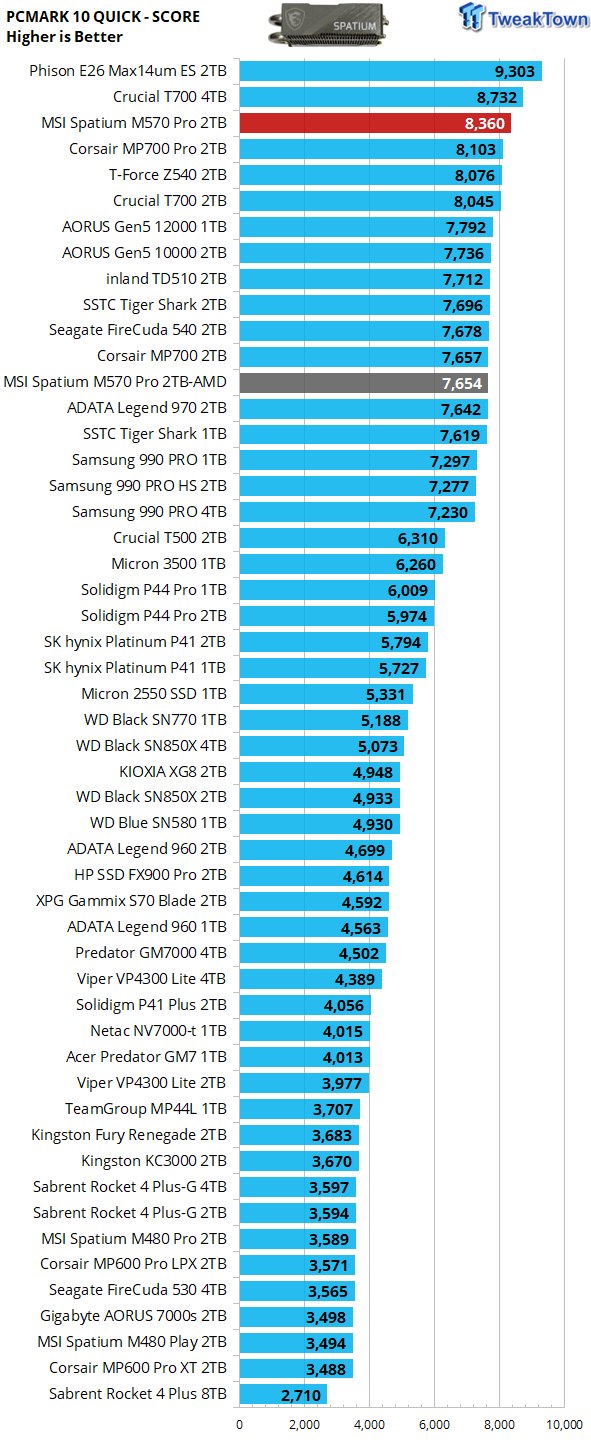
MSI's flagship performer delivers our first-ever score of 8,300 for a 2TB retail flash-based SSD. This is real performance, performance that matters. This is the tradeoff for that 100 MB/s sequential write speed we mentioned previously.
Final Thoughts
MSI's "Spatium" line of SSDs have become synonymous with premium performance and are well recognized the world over as being among the best SSDs of their kind ever made. As good as the others have been to this point, the newest PCIe Gen5 Spatium at 2TB stands apart from the rest as having a bit more in the tank than its similarly configured competition have delivered to this point. We find that especially impressive.
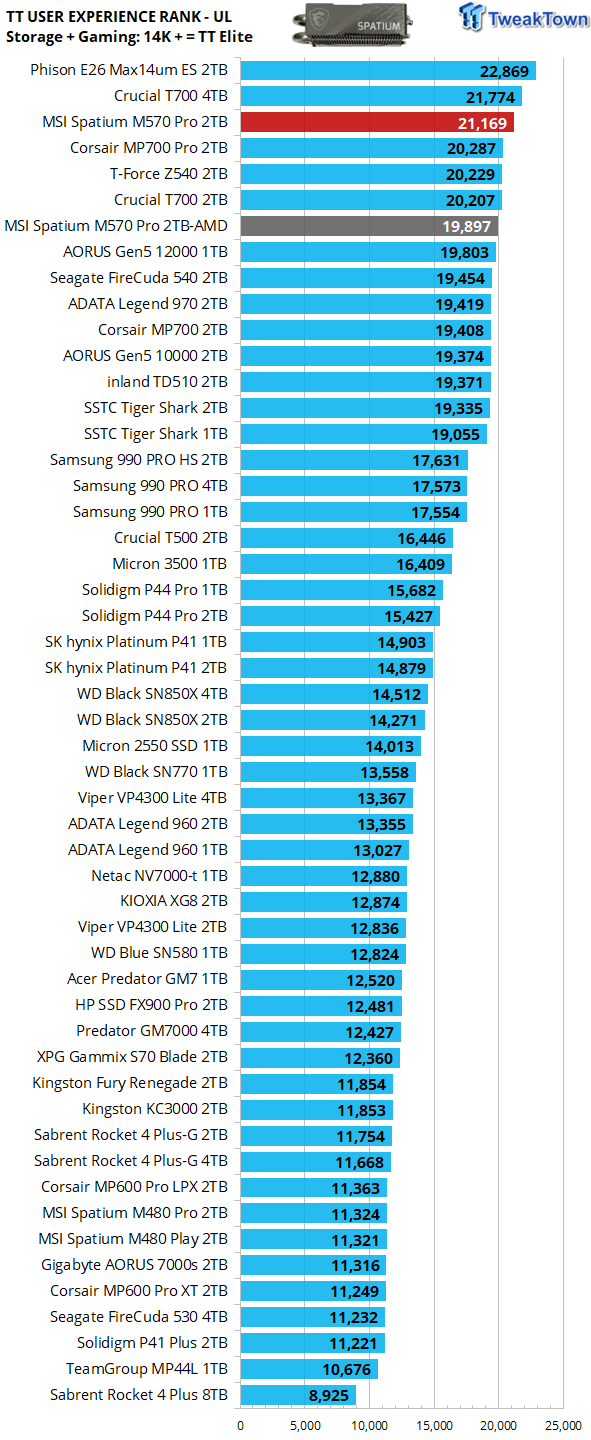
We rank SSDs in terms of overall user experience (performance where it matters most) as expressed by PCMark 10 storage and 3DMark gaming storage tests. We consider a user experience score of 14K or more to verify an SSD as a TweakTown Elite performer. By a significant margin, the Spatium M570 Pro is the highest-performing 2TB retail SSD we've tested to date.
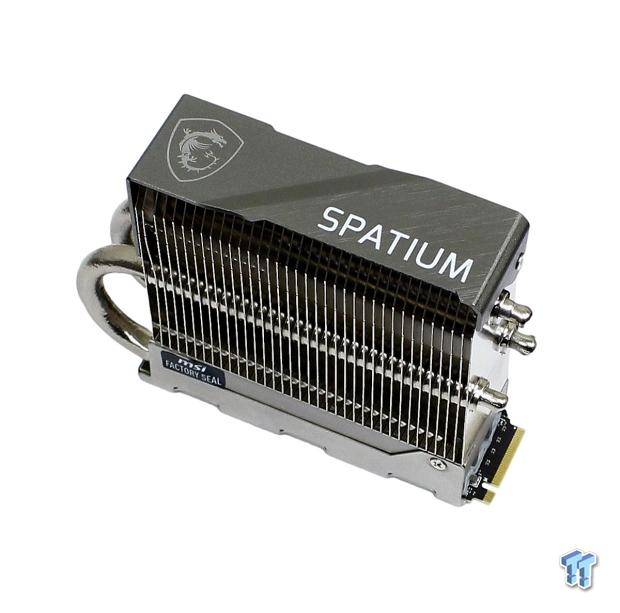
It's the highest-performing 2TB SSD we've tested to date and, as such, has earned our highest award. Editor's choice.

